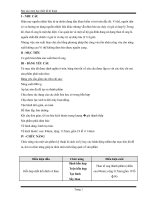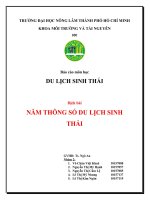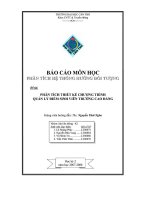Báo cáo môn học thống kê sinh thái học
Bạn đang xem bản rút gọn của tài liệu. Xem và tải ngay bản đầy đủ của tài liệu tại đây (486.04 KB, 17 trang )
HANOI UNIVERSITY OF SCIENCE
Final exam scientific report
Course V370: Research Methods and Statistical Modelings
Vu Tuan Tai- K55TT KHMT- 10000792
" Analysis of presence or absence of species.
The data to be analyzed is the data on the abundance of Faramea occidentalis (in attached text file).
Please explain the influence of precipitation, altitude, age and geology parameters on the presenceabsence of Faramea occidentalis species. The calculation and the numerical results are required. "
Contents
1. Analysis an influence of age category on the presence-absence of
Faramea occidentalis
1.1. Analysis by using quasi-binomial GLM
> Presabs.model3 <- glm(formula = Faramea.occidentalis>0 ~ Age.cat, family = quasibinomial(link=logit) , data = faramea, na.action =
na.exclude)
> summary(Presabs.model3)
Call:
glm(formula = Faramea.occidentalis > 0 ~ Age.cat, family = quasibinomial(link = logit),
data = faramea, na.action = na.exclude)
Deviance Residuals:
Min
1Q Median
3Q Max
-1.4350 -1.0008 -0.9005 1.0979 1.4823
Coefficients:
Estimate Std. Error t value Pr(>|t|)
(Intercept) 0.5878 0.5783 1.016 0.316
Age.cat[T.c2] -0.7701 0.8536 -0.902 0.372
Age.cat[T.c3] -1.2809 0.7767 -1.649 0.107
(Dispersion parameter for quasibinomial family taken to be 1.075)
Null deviance: 59.401 on 42 degrees of freedom
Residual deviance: 56.322 on 40 degrees of freedom
(2 observations deleted due to missingness)
AIC: NA
Number of Fisher Scoring iterations: 4
> anova(Presabs.model3,test="F")
Analysis of Deviance Table
Model: quasibinomial, link: logit
Response: Faramea.occidentalis > 0
Terms added sequentially (first to last)
Df Deviance Resid. Df Resid. Dev F Pr(>F)
NULL
42 59.401
Age.cat 2 3.0793
40 56.322 1.4322 0.2508
> predict(Presabs.model3, type="response", se.fit=T)
$fit
B0
B49
p1
p2
p3
p4
p5
p6
0.3333333 0.3333333 0.4545455 0.3333333 0.6428571 0.6428571 0.4545455 0.4545455
p7
p8
p9
p10
p11
p12
p13
p14
0.6428571 0.3333333 0.3333333 0.3333333 0.3333333 0.4545455 0.4545455 0.3333333
p15
p16
p17
p18
p19
p20
p21
p22
0.3333333 0.3333333 0.3333333 0.4545455 0.6428571 0.6428571 0.6428571 0.6428571
p23
p24
p25
p26
p27
p28
p29
p30
0.4545455 0.4545455 0.4545455 0.4545455 0.6428571 0.6428571 0.6428571 0.6428571
p31
p32
p33
p34
p35
p36
p37
p38
0.3333333 0.3333333 0.3333333 0.3333333 0.3333333 0.3333333 0.3333333 0.6428571
p39
p40
p41
C1
S0
0.6428571
NA
NA 0.6428571 0.4545455
$se.fit
B0
B49
p1
p2
p3
p4
p5
p6
0.1152024 0.1152024 0.1556596 0.1152024 0.1327757 0.1327757 0.1556596 0.1556596
p7
p8
p9
p10
p11
p12
p13
p14
0.1327757 0.1152024 0.1152024 0.1152024 0.1152024 0.1556596 0.1556596 0.1152024
p15
p16
p17
p18
p19
p20
p21
p22
0.1152024 0.1152024 0.1152024 0.1556596 0.1327757 0.1327757 0.1327757 0.1327757
p23
p24
p25
p26
p27
p28
p29
p30
0.1556596 0.1556596 0.1556596 0.1556596 0.1327757 0.1327757 0.1327757 0.1327757
p31
p32
p33
p34
p35
p36
p37
p38
0.1152024 0.1152024 0.1152024 0.1152024 0.1152024 0.1152024 0.1152024 0.1327757
p39
p40
p41
C1
S0
0.1327757
NA
NA 0.1327757 0.1556596
$residual.scale
[1] 1.036822
> null.model <- glm(formula = Faramea.occidentalis>0 ~ 1, family = quasibinomial(link=logit) , data = faramea, na.action = na.exclude)
> anova(null.model, Presabs.model3, test="Chi")
> plot(Presabs.model3)
> termplot(Presabs.model3, se=T, partial.resid=T, rug=T, terms="Age.cat")
> library(effects)
> plot(effect("Age.cat", Presabs.model3))
1.2. Graphical results
1.3. Discussion
We can see that the quasi-binomial model estimated the dispersion parameter to be 1.075.
Moreover, the ANOVA table provides a large significant level P=0.25. The ANOVA table also provides
important information on the deviance that is explained: the model only explains 3.079 per 59.401 of
null deviance ( approximately 5.2%- small percentage). So that we can conclude there is no evidence
for an influence of age on the presence-absence of Faramea occidentalis.
2. Analysis an influence of precipitation on the presence-absence of
Faramea occidentalis
2.2. Analysis by using quasi-binomial GLM
> Presabs.model4 <- glm(formula = Faramea.occidentalis>0 ~ Precipitation, family = quasibinomial(link=logit) , data = faramea, na.action =
na.exclude)
> summary(Presabs.model4)
Call:
glm(formula = Faramea.occidentalis > 0 ~ Precipitation, family = quasibinomial(link = logit),
data = faramea, na.action = na.exclude)
Deviance Residuals:
Min
1Q Median
3Q Max
-1.7303 -1.0431 -0.3289 1.1157 1.7268
Coefficients:
Estimate Std. Error t value Pr(>|t|)
(Intercept) 6.948352 2.828385 2.457 0.0183 *
Precipitation -0.002721 0.001095 -2.484 0.0172 *
--Signif. codes: 0 '***' 0.001 '**' 0.01 '*' 0.05 '.' 0.1 ' ' 1
(Dispersion parameter for quasibinomial family taken to be 0.9878704)
Null deviance: 59.401 on 42 degrees of freedom
Residual deviance: 50.561 on 41 degrees of freedom
(2 observations deleted due to missingness)
AIC: NA
Number of Fisher Scoring iterations: 4
> summary(Presabs.model4)
Call:
glm(formula = Faramea.occidentalis > 0 ~ Precipitation, family = quasibinomial(link = logit),
data = faramea, na.action = na.exclude)
Deviance Residuals:
Min
1Q Median
3Q Max
-1.7303 -1.0431 -0.3289 1.1157 1.7268
Coefficients:
Estimate Std. Error t value Pr(>|t|)
(Intercept) 6.948352 2.828385 2.457 0.0183 *
Precipitation -0.002721 0.001095 -2.484 0.0172 *
--Signif. codes: 0 '***' 0.001 '**' 0.01 '*' 0.05 '.' 0.1 ' ' 1
(Dispersion parameter for quasibinomial family taken to be 0.9878704)
Null deviance: 59.401 on 42 degrees of freedom
Residual deviance: 50.561 on 41 degrees of freedom
(2 observations deleted due to missingness)
AIC: NA
Number of Fisher Scoring iterations: 4
> anova(Presabs.model4,test="F")
Analysis of Deviance Table
Model: quasibinomial, link: logit
Response: Faramea.occidentalis > 0
Terms added sequentially (first to last)
Df Deviance Resid. Df Resid. Dev F Pr(>F)
NULL
42 59.401
Precipitation 1 8.8406
41 50.561 8.9492 0.004682 **
--Signif. codes: 0 '***' 0.001 '**' 0.01 '*' 0.05 '.' 0.1 ' ' 1
> predict(Presabs.model4, type="response", se.fit=T)
$fit
B0
B49
p1
p2
p3
p4
p5
0.51585260 0.51585260 0.23199505 0.19599449 0.22518137 0.22881035 0.59346000
p6
p7
p8
p9
p10
p11
p12
0.60691110 0.57754510 0.56615226 0.28611341 0.51632834 0.52570000 0.53836922
p13
p14
p15
p16
p17
p18
p19
0.48436383 0.51265767 0.56648644 0.53498590 0.55603305 0.52888801 0.40957580
p20
p21
p22
p23
p24
p25
p26
0.42958718 0.59536260 0.52692120 0.69682041 0.67793630 0.64473891 0.69428486
p27
p28
p29
p30
p31
p32
p33
0.66272350 0.66962240 0.83081979 0.77620128 0.11822036 0.11782378 0.05264970
p34
p35
p36
p37
p38
p39
p40
0.18149948 0.01904871 0.21490787 0.17079990 0.52441063 0.60248775
NA
p41
C1
S0
NA 0.85958830 0.21628851
$se.fit
B0
B49
p1
p2
p3
p4
p5
0.08456340 0.08456340 0.10310235 0.10255668 0.10318186 0.10314912 0.09028002
p6
p7
p8
p9
p10
p11
p12
0.09175142 0.08867379 0.08763705 0.10019974 0.08457920 0.08494578 0.08560342
p13
p14
p15
p16
p17
p18
p19
0.08413929 0.08446438 0.08766594 0.08541010 0.08680929 0.08509405 0.08779233
p20
p21
p22
p23
p24
p25
p26
0.08625142 0.09048256 0.08500118 0.10200951 0.10003257 0.09618903 0.10175731
p27
p28
p29
p30
p31
p32
p33
0.09830953 0.09910199 0.10311570 0.10641589 0.09025501 0.09013959 0.05987074
p34
p35
p36
p37
p38
p39
p40
0.10157356 0.03010363 0.10314943 0.10051629 0.08488917 0.09125797
NA
p41
C1
S0
NA 0.09818365 0.10316496
$residual.scale
[1] 0.9939167
> null.model <- glm(formula = Faramea.occidentalis>0 ~ 1, family = quasibinomial(link=logit) , data = faramea, na.action = na.exclude)
> anova(null.model, Presabs.model4, test="Chi")
Error in anova.glmlist(c(list(object), dotargs), dispersion = dispersion, :
models were not all fitted to the same size of dataset
> plot(Presabs.model4)
Waiting to confirm page change...
Waiting to confirm page change...
Waiting to confirm page change...
Waiting to confirm page change...
> termplot(Presabs.model4, se=T, partial.resid=T, rug=T, terms="Precipitation")
> library(effects)
> plot(effect("Precipitation", Presabs.model4))
>
2.2. Graphical results
2.3. Discussion
From the result above, we can see that the dispersion parameter is estimated to be 0.987, very close
to 1. In addition, we can obtain that there is evidence that precipitation has an effect on the
presence-absence of Faramea, because the significant level calculated for the coefficient is low
(P=0.0172) and the model can explain 8.84 per 59.401 of null deviance. We can also notice that there
is an effect of precipitation from the low significance level of the ANOVA table (P=0.005).
Here we need to calculate the inverse logit function y= exp(x)/(1+exp(x))
Where: x= intercept
So the value of y= exp(6.9483)/(1 + exp(6.9483-0.00272))= 1.0017
3. Analysis an influence of elevation (altitude) on the presenceabsence of Faramea occidentalis
3.1 Analysis by using quasi-binomial GLM
> Presabs.model4 <- glm(formula = Faramea.occidentalis>0 ~ Elevation, family = quasibinomial(link=logit) , data = faramea, na.action =
na.exclude)
> summary(Presabs.model4)
Call:
glm(formula = Faramea.occidentalis > 0 ~ Elevation, family = quasibinomial(link = logit),
data = faramea, na.action = na.exclude)
Deviance Residuals:
Min
1Q Median
3Q Max
-1.5768 -1.0960 -0.1003 0.9853 1.3298
Coefficients:
Estimate Std. Error t value Pr(>|t|)
(Intercept) 1.059522 0.548718 1.931 0.0604 .
Elevation -0.007838 0.003608 -2.172 0.0357 *
--Signif. codes: 0 '***' 0.001 '**' 0.01 '*' 0.05 '.' 0.1 ' ' 1
(Dispersion parameter for quasibinomial family taken to be 0.9235897)
Null deviance: 59.401 on 42 degrees of freedom
Residual deviance: 49.469 on 41 degrees of freedom
(2 observations deleted due to missingness)
AIC: NA
Number of Fisher Scoring iterations: 5
> summary(Presabs.model4)
Call:
glm(formula = Faramea.occidentalis > 0 ~ Elevation, family = quasibinomial(link = logit),
data = faramea, na.action = na.exclude)
Deviance Residuals:
Min
1Q Median
3Q Max
-1.5768 -1.0960 -0.1003 0.9853 1.3298
Coefficients:
Estimate Std. Error t value Pr(>|t|)
(Intercept) 1.059522 0.548718 1.931 0.0604 .
Elevation -0.007838 0.003608 -2.172 0.0357 *
--Signif. codes: 0 '***' 0.001 '**' 0.01 '*' 0.05 '.' 0.1 ' ' 1
(Dispersion parameter for quasibinomial family taken to be 0.9235897)
Null deviance: 59.401 on 42 degrees of freedom
Residual deviance: 49.469 on 41 degrees of freedom
(2 observations deleted due to missingness)
AIC: NA
Number of Fisher Scoring iterations: 5
> anova(Presabs.model4,test="F")
Analysis of Deviance Table
Model: quasibinomial, link: logit
Response: Faramea.occidentalis > 0
Terms added sequentially (first to last)
Df Deviance Resid. Df Resid. Dev F Pr(>F)
NULL
42 59.401
Elevation 1 9.9317
41 49.469 10.753 0.002127 **
--Signif. codes: 0 '***' 0.001 '**' 0.01 '*' 0.05 '.' 0.1 ' ' 1
> predict(Presabs.model4, type="response", se.fit=T)
$fit
B0
B49
p1
p2
p3
p4
0.529708571 0.529708571 0.711517145 0.568499634 0.413067396 0.413067396
p5
p6
p7
p8
p9
p10
0.678307798 0.695166342 0.643192603 0.660971608 0.103956639 0.587614191
p11
p12
p13
p14
p15
p16
0.643192603 0.727334914 0.652135099 0.643192603 0.625010199 0.451517474
p17
p18
p19
p20
p21
p22
0.529708571 0.646782001 0.451517474 0.451517474 0.549178826 0.413067396
p23
p24
p25
p26
p27
p28
0.695166342 0.660971608 0.549178826 0.660971608 0.413067396 0.451517474
p29
p30
p31
p32
p33
p34
0.568499634 0.413067396 0.163984396 0.143608856 0.025500776 0.357453005
p35
p36
p37
p38
p39
p40
0.004295295 0.375649093 0.025500776 0.005020600 0.016087593
NA
p41
C1
S0
NA 0.660971608 0.490555259
$se.fit
B0
B49
p1
p2
p3
p4
p5
0.08146756 0.08146756 0.10112096 0.08255982 0.09403845 0.09403845 0.09628896
p6
p7
p8
p9
p10
p11
p12
0.09880798 0.09097973 0.09364622 0.10141856 0.08406130 0.09097973 0.10316293
p13
p14
p15
p16
p17
p18
p19
0.09230903 0.09097973 0.08840591 0.08774458 0.08146756 0.09150956 0.08774458
p20
p21
p22
p23
p24
p25
p26
0.08774458 0.08166658 0.09403845 0.09880798 0.09364622 0.08166658 0.09364622
p27
p28
p29
p30
p31
p32
p33
0.09403845 0.08774458 0.08255982 0.09403845 0.11807371 0.11418257 0.04360614
p34
p35
p36
p37
p38
p39
p40
0.10458585 0.01101142 0.10109007 0.04360614 0.01250399 0.03114841
NA
p41
C1
S0
NA 0.09364622 0.08327455
$residual.scale
[1] 0.9610358
> null.model <- glm(formula = Faramea.occidentalis>0 ~ 1, family = quasibinomial(link=logit) , data = faramea, na.action = na.exclude)
> anova(null.model, Presabs.model4, test="Chi")
> plot(Presabs.model4)
> termplot(Presabs.model4, se=T, partial.resid=T, rug=T, terms="Elevation")
> library(effects)
> plot(effect("Elevation", Presabs.model4))
3.2. Graphical results
3.3. Discussion
According to the above results, the model explain 9.9317 or 16.72% of total deviance. Furthermore,
the Pr-value ~ 0.0357 is very low implies there is evidence so that the elevation has effect on the
presence/absence of Faramea.
Here we must calculate the inverse logit y= exp(x)/(1+(1+exp(x))
So, y=exp(1.0595)/(1+exp(1.0595-0.00784))= 0.747
4. Analysis an influence of geology on the presence-absence of
Faramea occidentalis
4.1. Analysis by using quasi-binomial GLM
> Presabs.model4 <- glm(formula = Faramea.occidentalis>0 ~ Geology, family = quasibinomial(link=logit) , data = faramea, na.action =
na.exclude)
> summary(Presabs.model4)
Call:
glm(formula = Faramea.occidentalis > 0 ~ Geology, family = quasibinomial(link = logit),
data = faramea, na.action = na.exclude)
Deviance Residuals:
Min
1Q Median
3Q Max
-1.7941 -0.4854 -0.4854 0.6681 2.0963
Coefficients:
Estimate Std. Error t value Pr(>|t|)
(Intercept) -2.0794 0.7395 -2.812 0.00792 **
Geology[T.Tb] 3.4657 1.3275 2.611 0.01309 *
Geology[T.Tbo] 20.6455 6431.4085 0.003 0.99746
Geology[T.Tc] 2.3671 1.0555 2.243 0.03116 *
Geology[T.Tcm] 20.6455 2876.2134 0.007 0.99431
Geology[T.Tgo] 1.6740 1.1649 1.437 0.15936
Geology[T.Tl] 20.6455 4547.6926 0.005 0.99640
--Signif. codes: 0 '***' 0.001 '**' 0.01 '*' 0.05 '.' 0.1 ' ' 1
(Dispersion parameter for quasibinomial family taken to be 0.9722222)
Null deviance: 59.401 on 42 degrees of freedom
Residual deviance: 33.853 on 36 degrees of freedom
(2 observations deleted due to missingness)
AIC: NA
Number of Fisher Scoring iterations: 17
> summary(Presabs.model4)
Call:
glm(formula = Faramea.occidentalis > 0 ~ Geology, family = quasibinomial(link = logit),
data = faramea, na.action = na.exclude)
Deviance Residuals:
Min
1Q Median
3Q Max
-1.7941 -0.4854 -0.4854 0.6681 2.0963
Coefficients:
Estimate Std. Error t value Pr(>|t|)
(Intercept) -2.0794 0.7395 -2.812 0.00792 **
Geology[T.Tb] 3.4657 1.3275 2.611 0.01309 *
Geology[T.Tbo] 20.6455 6431.4085 0.003 0.99746
Geology[T.Tc] 2.3671 1.0555 2.243 0.03116 *
Geology[T.Tcm] 20.6455 2876.2134 0.007 0.99431
Geology[T.Tgo] 1.6740 1.1649 1.437 0.15936
Geology[T.Tl] 20.6455 4547.6926 0.005 0.99640
--Signif. codes: 0 '***' 0.001 '**' 0.01 '*' 0.05 '.' 0.1 ' ' 1
(Dispersion parameter for quasibinomial family taken to be 0.9722222)
Null deviance: 59.401 on 42 degrees of freedom
Residual deviance: 33.853 on 36 degrees of freedom
(2 observations deleted due to missingness)
AIC: NA
Number of Fisher Scoring iterations: 17
> anova(Presabs.model4,test="F")
Analysis of Deviance Table
Model: quasibinomial, link: logit
Response: Faramea.occidentalis > 0
Terms added sequentially (first to last)
Df Deviance Resid. Df Resid. Dev F Pr(>F)
NULL
42 59.401
Geology 6 25.548
36 33.853 4.3797 0.002027 **
--Signif. codes: 0 '***' 0.001 '**' 0.01 '*' 0.05 '.' 0.1 ' ' 1
> predict(Presabs.model4, type="response", se.fit=T)
$fit
B0
B49
p1
p2
p3
p4
p5
p6
0.8000000 0.8000000 0.5714286 0.5714286 0.5714286 0.5714286 0.4000000 0.4000000
p7
p8
p9
p10
p11
p12
p13
p14
0.4000000 0.1111111 0.1111111 1.0000000 1.0000000 1.0000000 1.0000000 1.0000000
p15
p16
p17
p18
p19
p20
p21
p22
0.4000000 0.1111111 0.1111111 1.0000000 0.1111111 0.1111111 0.4000000 0.8000000
p23
p24
p25
p26
p27
p28
p29
p30
0.5714286 0.5714286 0.1111111 0.1111111 1.0000000 1.0000000 0.8000000 0.8000000
p31
p32
p33
p34
p35
p36
p37
p38
0.1111111 0.1111111 0.1111111 0.1111111 0.1111111 0.1111111 0.1111111 0.1111111
p39
p40
p41
C1
S0
0.1111111
NA
NA 0.1111111 0.5714286
$se.fit
B0
B49
p1
p2
p3
p4
1.763834e-01 1.763834e-01 1.844278e-01 1.844278e-01 1.844278e-01 1.844278e-01
p5
p6
p7
p8
p9
p10
2.160247e-01 2.160247e-01 2.160247e-01 7.303802e-02 7.303802e-02 2.487024e-05
p11
p12
p13
p14
p15
p16
2.487024e-05 5.561155e-05 2.487024e-05 2.487024e-05 2.160247e-01 7.303802e-02
p17
p18
p19
p20
p21
p22
7.303802e-02 2.487024e-05 7.303802e-02 7.303802e-02 2.160247e-01 1.763834e-01
p23
p24
p25
p26
p27
p28
1.844278e-01 1.844278e-01 7.303802e-02 7.303802e-02 3.932330e-05 3.932330e-05
p29
p30
p31
p32
p33
p34
1.763834e-01 1.763834e-01 7.303802e-02 7.303802e-02 7.303802e-02 7.303802e-02
p35
p36
p37
p38
p39
p40
7.303802e-02 7.303802e-02 7.303802e-02 7.303802e-02 7.303802e-02
NA
p41
C1
S0
NA 7.303802e-02 1.844278e-01
$residual.scale
[1] 0.9860133
> null.model <- glm(formula = Faramea.occidentalis>0 ~ 1, family = quasibinomial(link=logit) , data = faramea, na.action = na.exclude)
> anova(null.model, Presabs.model4, test="Chi")
Error in anova.glmlist(c(list(object), dotargs), dispersion = dispersion, :
models were not all fitted to the same size of dataset
> plot(Presabs.model4)
Warning: not plotting observations with leverage one:
14
Waiting to confirm page change...
Waiting to confirm page change...
Waiting to confirm page change...
Warning: not plotting observations with leverage one:
14
Waiting to confirm page change...
> termplot(Presabs.model4, se=T, partial.resid=T, rug=T, terms="Geology")
> library(effects)
> plot(effect("Geology", Presabs.model4))
>
4.2. Graphical results
4.3. Discussion
Accordingly, the variance of presence- absence of Faramea occidentalis is 25.548 per 59.401 of total
deviance (43%). Moreover, the Pr-value~ 0.002027 in the ANOVA table implies that geology has
significant effect on the presence-absence of species. The inverse logit function must be y=exp(x)/
(1+exp(x))
For example: with Geology[T.Tb]: y=exp(-2.0794)/(1+exp(-2.0794+3.4657))=0.025
5. Analysis the influence of several explanatory variables on the
presence-absence of Faramea occidentalis by using binomial GLM
5.1. Results
> Presabs.model6 <- glm(formula = Faramea.occidentalis > 0 ~ Precipitation + I(Precipitation^2) + Geology + Age.cat + Elevation +
I(Elevation^2), family = binomial(link = logit) , data = faramea, na.action = na.exclude)
Warning: glm.fit: fitted probabilities numerically 0 or 1 occurred
> summary(Presabs.model6)
Call:
glm(formula = Faramea.occidentalis > 0 ~ Precipitation + I(Precipitation^2) +
Geology + Age.cat + Elevation + I(Elevation^2), family = binomial(link = logit),
data = faramea, na.action = na.exclude)
Deviance Residuals:
Min
1Q Median
3Q
Max
-2.03069 -0.02753 0.00000 0.08387 1.97738
Coefficients:
Estimate Std. Error z value Pr(>|z|)
(Intercept)
-1.137e+02 8.737e+01 -1.302 0.193
Precipitation
1.006e-01 7.594e-02 1.324 0.185
I(Precipitation^2) -2.223e-05 1.644e-05 -1.352 0.176
Geology[T.Tb]
1.401e+00 1.718e+00 0.815 0.415
Geology[T.Tbo] 2.962e+01 1.075e+04 0.003 0.998
Geology[T.Tc]
1.266e+01 8.055e+00 1.572 0.116
Geology[T.Tcm] 2.642e+01 4.153e+03 0.006 0.995
Geology[T.Tgo] -1.270e+00 2.709e+00 -0.469 0.639
Geology[T.Tl]
1.792e+01 7.274e+03 0.002 0.998
Age.cat[T.c2] -9.695e+00 1.024e+01 -0.946 0.344
Age.cat[T.c3] -2.983e+00 2.458e+00 -1.214 0.225
Elevation
8.701e-02 1.161e-01 0.749 0.454
I(Elevation^2) -4.493e-04 5.293e-04 -0.849 0.396
(Dispersion parameter for binomial family taken to be 1)
Null deviance: 59.401 on 42 degrees of freedom
Residual deviance: 17.376 on 30 degrees of freedom
(2 observations deleted due to missingness)
AIC: 43.376
Number of Fisher Scoring iterations: 18
> anova(Presabs.model6,test="Chi")
Warning: glm.fit: fitted probabilities numerically 0 or 1 occurred
Warning: glm.fit: fitted probabilities numerically 0 or 1 occurred
Analysis of Deviance Table
Model: binomial, link: logit
Response: Faramea.occidentalis > 0
Terms added sequentially (first to last)
NULL
Df Deviance Resid. Df Resid. Dev Pr(>Chi)
42 59.401
Precipitation
1 8.8406
41 50.561 0.002946 **
I(Precipitation^2) 1 0.7224
40 49.838 0.395367
Geology
6 21.1442
34 28.694 0.001728 **
Age.cat
2 7.6046
32 21.089 0.022320 *
Elevation
1 2.8375
31 18.252 0.092088 .
I(Elevation^2) 1 0.8761
30 17.376 0.349285
--Signif. codes: 0 '***' 0.001 '**' 0.01 '*' 0.05 '.' 0.1 ' ' 1
> drop1(Presabs.model6, test="Chi")
Warning: glm.fit: fitted probabilities numerically 0 or 1 occurred
Warning: glm.fit: fitted probabilities numerically 0 or 1 occurred
Warning: glm.fit: fitted probabilities numerically 0 or 1 occurred
Warning: glm.fit: fitted probabilities numerically 0 or 1 occurred
Warning: glm.fit: fitted probabilities numerically 0 or 1 occurred
Single term deletions
Model:
Faramea.occidentalis > 0 ~ Precipitation + I(Precipitation^2) +
Geology + Age.cat + Elevation + I(Elevation^2)
Df Deviance AIC LRT Pr(>Chi)
<none>
17.376 43.376
Precipitation
1 20.871 44.871 3.4952 0.0615481 .
I(Precipitation^2) 1 21.441 45.441 4.0652 0.0437749 *
Geology
6 40.674 54.674 23.2984 0.0007025 ***
Age.cat
2 24.799 46.799 7.4234 0.0244364 *
Elevation
1 18.020 42.020 0.6445 0.4220785
I(Elevation^2) 1 18.252 42.252 0.8761 0.3492853
--Signif. codes: 0 '***' 0.001 '**' 0.01 '*' 0.05 '.' 0.1 ' ' 1
>
5.2. Discussion
More specific, the complex model in which all explanatory variable is much better in demonstrating
the impact on the presence-absence of Faramea occidentalis.
As the result, we get the logit link function
X=Logit(µ)= a + b1. x1+ b2.x2+b3.x3…
Where a= intercept
b1, b2,b3.. = coefficient estimate value of each category
So, that the inverse logit Y= exp(X)+(1+exp(X))
Conclusion
We can see that each category variable (age, precipitation, altitude, geology) has its own influence
on response variable as the presence-absence of Faramea occidentalis at certain level (even maybe
at zero-level). Howeve, in order to get more exact result analysis, the complex model in which
include both 4 categories in the GLM should be used.









